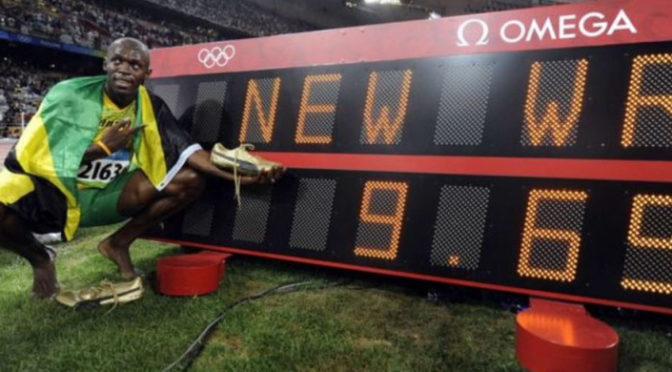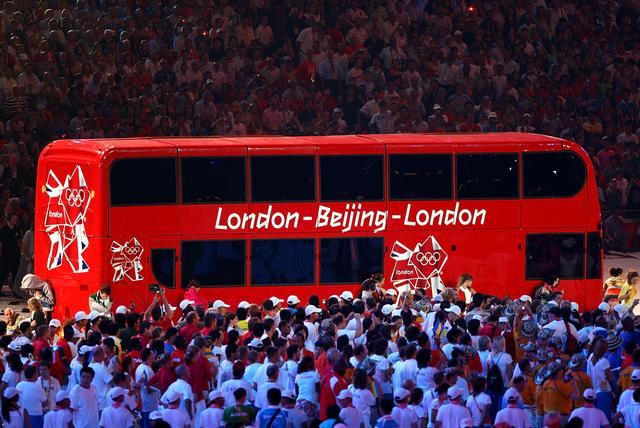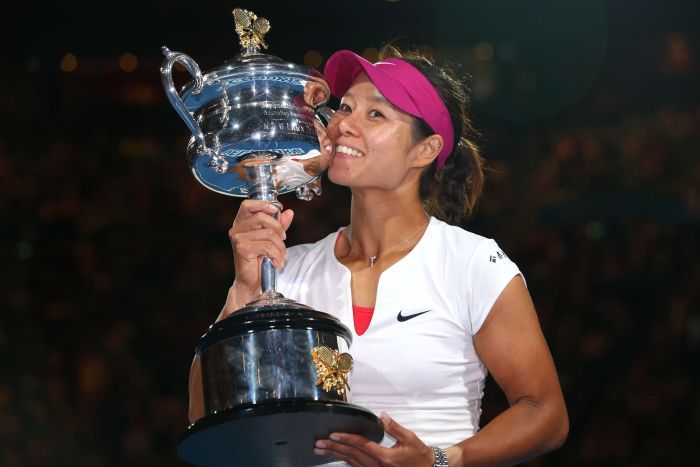Ten years ago tonight, I had the privilege of witnessing one of the most dominant Olympic performances of our time, as Usain Bolt ran 9.69 in the men’s 100m final at the 2008 Beijing Olympics. But I nearly missed the race entirely – and much has changed in China’s sports scene over the ensuing decade.
One of the benefits of covering the Olympic Games as an accredited TV journalist is having a pass that gets you access into pretty much every venue. You can’t wander onto the track at will or take a seat poolside, but you can generally find some space in the media section, which typically offers a pretty good view. There’s so much sport to cover at a Games that major TV stations – in Beijing, I was working for Canada’s CBC – typically work around the clock, especially when you are beaming the signal back to the other side of the world, so staff are split into parallel 12-hour shifts so that no detail gets missed. But when your shift is over, you’re free to catch some of the sporting action – all in the name of Olympic research, of course.
However, the men’s 100m final is one of the few events – like the Opening and Closing Ceremonies or a Michael Phelps final – that are so popular that even the media need tickets. And on the night of August 16 at the 2008 Beijing Olympics, about an hour before Usain Bolt was set to race, I hadn’t managed to get one.
I was back at home and called my friend to ask where he planned to watch the race on TV.
“I’m at the Bird’s Nest. We’ve got tickets!”
Damn. I had forgotten.
“That’s too bad,” I replied. “I can’t get into this one. The media need special tickets.”
“Well, from where I’m looking, the media section looks pretty empty right now. You should give it a go.”
I didn’t need telling twice. I ran outside to flag a taxi, but a rainstorm meant they were hard to find. For a moment, I thought I might be stuck in a cab somewhere between the Olympic Park and a TV – or, worse still, standing in the rain – when the starter’s pistol was fired. But I finally managed to flag one down and arrived at the Olympic stadium with about 20 minutes to go.
Likely due to the downpour that had just soaked half the crowd, those media lucky enough to have an actual ticket for the final must have taken refuge in the broadcast center, meaning that the media section was almost entirely deserted. I grabbed a beer from the concessions stands in the bowels of the stadium, headed all the way down to the fourth row from the track, and took a seat next to a couple of familiar faces from the BBC.
Adrian Chiles was at that time one of their morning show presenters, while Matthew Pinsent was a former athlete turned analyst. I’m not usually star struck, but Pinsent – or Sir Matthew Pinsent to give him his proper title – is without question one of the greatest Olympians the UK has ever seen, winning rowing gold medals in four consecutive Olympics 1992-2004. And here I was covering my very first Olympics, having a beer with the great man as Bolt warmed up just a few meters away.
If you’ve never seen the race, or even if you have, it’s worth another look, with Bolt winning by a massive two-tenths of a second. It was the first of what would eventually be nine Olympic gold medals, though he’s since lost one when relay teammate Nesta Carter‘s stored blood sample tested positive nine years later.
But when Bolt looked to his right with about 15 meters to go and started to celebrate early (in a move that IOC President Jacques Rogge and others would later call “disrespectful”), that was *exactly* where I was sitting. It was quite a night.
Other highlights from the 2008 Beijing Olympics include watching Phelps rack up an incredible – yet somehow inevitable – eight Olympic titles, despite ostensibly being beaten by Milorad Cavic in perhaps the greatest swim race of all time; I saw Lionel Messi‘s Argentina beat Ronaldinho‘s Brazil 3-0 in the men’s football semi-final, with second-half goals from Sergio Aguero (2) and Juan Riquelme; I witnessed Hungary defeat the United States to win their third straight Olympic title in men’s water polo in a thrilling, and typically bruising, encounter; and, as a Brit, I felt more than a little pride in the Bird’s Nest stadium during the Closing Ceremony when that iconic red London bus, along with David Beckham, Jimmy Page and others, conveyed the sort of personable charm that Beijing’s stage-managed extravaganza never quite achieved.
China’s Olympic hangover
China didn’t exactly enter a sporting wilderness after the 2008 Beijing Olympics, but there was certainly a dip. Hurdler Liu Xiang never really recovered from his tearful exit at the Bird’s Nest and probably should have retired long before he finally did so in 2015. Yao Ming, meanwhile, had carried the Chinese flag into the Bird’s Nest at the Opening Ceremony before nailing a three-pointer to open the scoring during China’s game against the US – the hottest ticket in town; but Yao effectively only played one more season in the NBA before injuries forced his retirement.
Around the same time, the Chinese Super League saw players, referees and officials arrested in a massive match-fixing scandal that set the league back by years.
But it wasn’t all doom and gloom. Li Na’s stunning win at the 2011 French Open couldn’t have come at a better time to restore some national sporting pride, as she beat four top ten players, including Maria Sharapova, en route to a straight sets win in the final. By following that up with the Australian Open title in 2014 – and this endearing victory speech – Li has arguably changed the face of global tennis, even though we might not see the results of that for another few years.
Policy priorities
However, the most significant sporting moment in the past decade was also one of the least interesting.
In October 2014, the Chinese government released a policy document – now simply referred to as ‘Number 46’ – that outlined China’s plan to create the biggest sports industry in the world, with the target of five trillion RMB in annual revenue by 2025.
It is this document more than anything else that has ultimately been responsible for much of the sports industry’s growth since then, from Chinese investment into European football clubs and eye-watering wages being offered in the Chinese Super League to the rise of fitness trends such as running and exercise clubs. I’d even go as far as to say it secured the 2022 Winter Olympics for China, as Beijing edged out Almaty by 44 votes to 40 in a decision that was announced in July 2015 – less than a year after the policy was released. With a seemingly relentless quest to develop sports of all kinds already underway, enough IOC members were convinced that Beijing could still stage a successful Winter Games, despite being almost entirely devoid of snow.
Roller coaster ride
But, as with almost everything in China, the path of progress has not been without some bumps in the road.
The CSL has moved on from the dark days of the match-fixing era, but the bubble in overseas football investment has already started to deflate, and with the league losing Belgian World Cup star Axel Witsel and – potentially – French striker Anthony Modeste this week alone, it looks like the overspending domestically could also be at an end.
Broadcast rights for sports took a massive hike on the back of #46’s stated intentions, with upstart LeSports leading the way – but that didn’t last long. Suning’s PPTV has picked up some of the slack, but a renegotiated, lower deal for CSL rights has forced a little more realism on the market. Another new Chinese player on the scene, DDMC, stunned the global football industry this summer by underwriting an eight-year deal for rights to the Asian Football Confederation’s tournaments worth more than $4 billion. It’s too soon to make a judgement on that particular valuation, but no one would be surprised if that, too, goes south.
Sponsorship is another large part of any sports industry, and while it was encouraging to see seven Chinese companies jump on the FIFA World Cup bandwagon, the industry as a whole has stagnated. Here are some of the sponsors from the 2008 Olympics: Air China, Bank of China, CNPC, China Mobile, State Grid, Sinopec. Now here are some of the names who have already signed up to sponsor the 2022 Olympics: Air China, Bank of China, CNPC, China Unicom, Sinopec.
It’s to be expected, of course, that China mobilizes its state-owned enterprises for the sake of national glory, but in the absence of more dynamic names, don’t expect these companies to do much in the way of activation i.e. actually leveraging that Olympic sponsorship for any other purpose, sporting or otherwise. China Unicom might stick the five rings on its top-up cards, but that’s about it.
Making sense of the numbers
I came to China specifically for the Olympics, and never intended to stay much beyond, but 11 years later, Beijing is still home. It’s been personally fascinating to see the sports industry go through two boom cycles and, overall, the sports industry is in a far healthier position than when I first arrived.
Primarily, sports is now an official part of the wider economy, but the headlines perhaps overstate its importance among China’s myriad priorities. Yes, it has a seat at the table, but it sometimes feels less like the top table than the proverbial Table 19 at your cousin’s wedding.
For all the issues, though, China is still essential for the global sports industry. Yao Ming and, to a lesser extent, Li Na have changed the framework of their respective sports. Just imagine what could happen if China ever produces a true soccer star.
China’s is still the central driver for growth for all the big sports brands and it’s where leagues, teams and even individual players are focused for their next initiatives. But the hardest thing can be to quantify it all.
Consider, for a moment, the ludicrous number of unchecked figures that swirl around the sports industry here. Who truly believes that 120 million Chinese will become regular skiers? Or that 240 million people watched the World Cup final on the unknown Migu Sports app? And don’t get me started on the semantics of the word “fan”, of which Manchester United apparently have more than 100 million here, while another 33 million Chinese rugby “fans” are claimed by the sport’s governing body. Those numbers and many more besides are all #FakeStats, to paraphrase a certain somebody, but you see them repeated regularly in print.
However, the biggest number of them all – five trillion RMB – has remained unchanged since the target was announced four years ago. I’ve spoken to plenty of people who think that this should be well within China’s reach, but if anyone thinks they can accurately tally up what exactly constitutes the sports industry here, please get in touch.
China’s sports industry is, in some ways, a microcosm of the country’s economy – simultaneously saving the world, while perched on the edge of the precipice (depending on who you ask). It’s the potential of the sports market that continues to generate excitement, both in China and globally, and the next decade will surely bring more dramatic changes to the industry – if it doesn’t get consumed by its own hype first.
A modified version of this column originally appeared at SupChina here.





article https://cazino-v.online
Here Olympic games were very interesting, Wonder when we will get back to normal and have same sports events… will it be soon or not